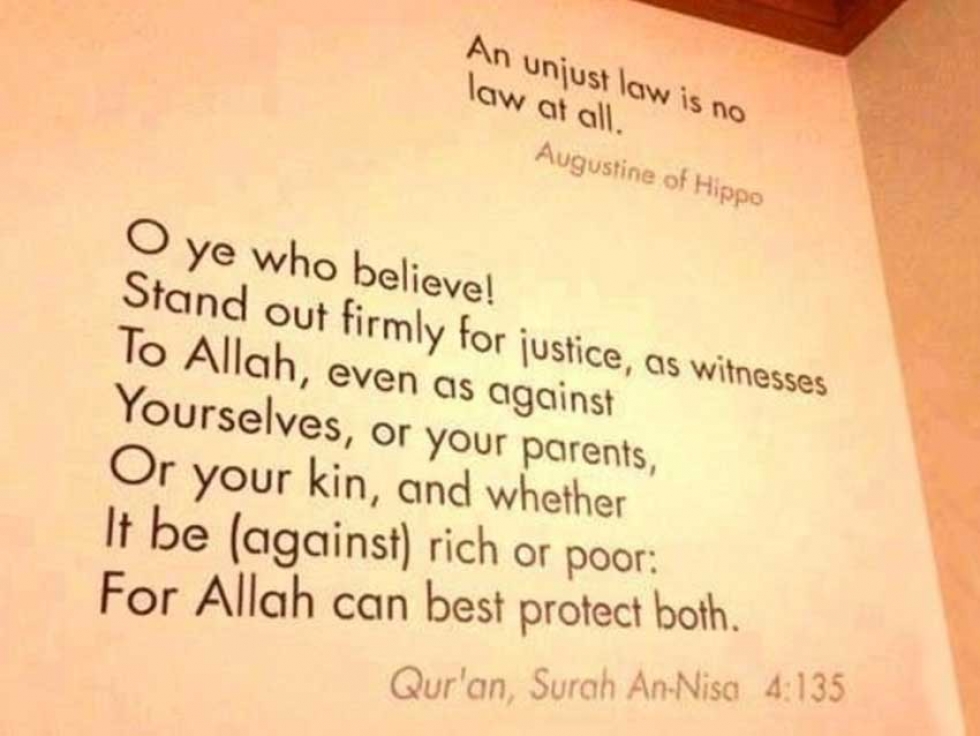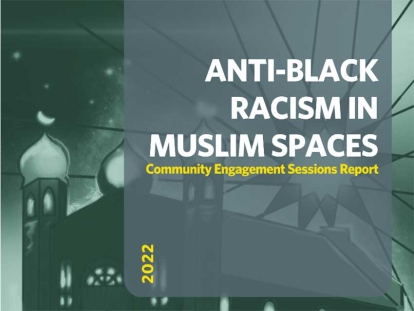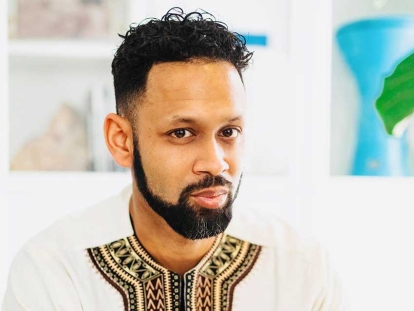 Verse 135 of Surah Al Nisa is included among some of the greatest expressions of justice in the art installation Words of Justice at Harvard Law School.
StepFeed
Verse 135 of Surah Al Nisa is included among some of the greatest expressions of justice in the art installation Words of Justice at Harvard Law School.
StepFeed
Jul
Real Actions Canadian Muslims Can Take to Address Anti-Black Racism within Themselves, Muslim Organizations and Canadian Society
Written by Making HeadlinesIn the wake of the murder of George Floyd, there has been increased interest in Muslim communities to discuss issues of anti-Black racism within society.
Muslim Link has written and published stories aimed at addressing anti-Black racism in Muslim communities over the last eight years. The following recommendations are informed by this work, our experience receiving media requests for Muslim speakers, our regular reading of coverage of Muslim communities by mainstream and Muslim media, and our observations publishing thousands of Muslim community events from across Canada over several years.
Muslim Link wrote this with the Quranic Verse 135 of Surah Al Nisa as a guiding principle: "O you who have believed, be persistently standing firm in justice, witnesses for Allah, even if it be against yourselves or parents and relatives. Whether one is rich or poor, Allah is more worthy of both. So follow not [personal] inclination, lest you not be just. And if you distort [your testimony] or refuse [to give it], then indeed Allah is ever, with what you do, Acquainted." (Sahih International)
Here are our recommendations:
Understand that Prophet Mohammad (PBUH) commanded Muslims to oppose racism over 1400 years ago but, unfortunately, racism is still rampant and alive.
As Muslims, we have been blessed with a perfect model in the Holy Quran and Prophetic tradition on how to appropriately operate within our respective societies both at an individual and communal level. However, contrary to what our perfect religion teaches; Muslim run community spaces, Islamic schools, mosques, youth committees, and university MSA’s are guilty of being amongst the biggest culprits of racial prejudice. We need to be authentic and willing to address the issues within our immediate communities as well. We also have to realize that anti-black racism has been developed and learned throughout the history of some Muslim majority countries.
Many Muslims take comfort in claiming to know the teachings of Prophet Mohammad (PBUH) who gave us a model of being an anti-racist. However, when will we take the step forward outside of our comfort zones to tackle the real issues on the ground and embody this prophetic model? Throughout the last 1400 years, racism has unfortunately expanded in Muslim communities globally. Black peoples descended from slaves to this day face anti-Black racist discrimination in Muslim majority countries like Tunisia and Pakistan. These forms of discrimination have travelled with Muslim immigrants to Canada where Muslim children and adults are known to use anti-Black racist slurs like abeed (slave) by Arabic speakers or kalu by South Asian language speakers against Black people in Canada. Also, children and youth from Black communities in Canada have become familiar with being called dhagax (stone) by some Somali speakers from the Horn of Africa who have a false impression that they are superior to other Black people.
Canada is also home to African migrants and refugees who have travelled through Muslim majority countries where they experienced anti-Black racist discrimination and violence. These people now find themselves in Canada where these experiences are sometimes repeated in elementary and high schools, university and college campuses and even workplaces.
Our community needs to recognize that acts of anti-Black racism by Muslims is not just a problem “within” the Muslim community to be dealt with “internally” and only among Muslims, but rather it is also experienced by non-Muslim Black peoples. This drastically fails to give Black peoples a good impression of our faith or community.
Abu Nadrah reported: The Messenger of Allah, peace and blessings be upon him, said in the final days of the pilgrimage: O people, your Lord is one and your father Adam is one. There is no favour of an Arab over a foreigner, nor a foreigner over an Arab, and neither white skin over black skin, nor black skin over white skin, except by righteousness. Have I not delivered the message? Source: Musnad Ahmad 22978, Grade: Sahih
Address the Lack of Black Representation at the Leadership Level within Canadian Muslim Organizations
Mosque Boards, Muslim Students Association (MSA) Executive Committees, Muslim charities and non-profits, event planning teams, festival planning teams, and conference planning teams must work on creating a transparent method of engagement to address the lack of Black representation in leadership positions within their organizations. In order to avoid tokenism, the priority should be in recruiting confident and accomplished Black Muslim community members who are respected by, accessible, and well-connected to local and national Black Muslim communities.
Address the Lack of Black Representation as Speakers and Organizers for Muslim Lectures, Webinars, Career Fairs, Media Interviews, and Conferences
There is a great deal of expertise within Black Muslim communities across Canada, but we seldom see that reflected in the choices of speakers at Canadian Muslim lectures, webinars, podcasts, TV/YouTube shows, career fairs, interviews with Muslim media, and conferences. Often, you will only see Black Muslims interviewed if they are being asked to discuss racism. Why?
There are many Black Muslims in Canada who are experts in Islamic Studies, Science, Technology, Engineering, Mathematics (STEM), law, social work, education, nursing, mental health, immigration and settlement, journalism, government, politics and etc. Despite this, we hardly see any of these Black Muslims invited to speak on their full range of expertise. And if Black Muslims are invited to speak, it is often only the same couple of speakers every time. Do Muslims really think there are so few Black Muslim men and women in Canada qualified to discuss issues? Why?
Sadly, often the achievements, talents, and expertise of Black Muslims will be recognized and celebrated by non-Muslim Canadian mainstream organizations and media before any Canadian Muslim media or organizations reach out to these people. This is an example of the systemic anti-Black racism within Muslim organizations in Canada and raises questions not only about the discrimination within Muslim organizations but also how these same Muslim decision-makers, who often work within mainstream Canadian workplaces, treat their Black coworkers? Do they also overlook Black talent and expertise at their work?
Consistent Educational Opportunities for Youth Aimed at Combating Anti-Black Racism within Muslim Communities
Muslim Student Association (MSA) Spaces, at both the high school and post-secondary level, as well as Masjid Youth committees, need to create consistent educational workshops throughout the year revolving around combating anti-black racism within Muslim community spaces and Canadian society as a whole. Having these workshops only during Black History month is not sufficient.
If MSAs and Masjid Youth Committees are aimed at nurturing future Canadian Muslim leaders who will have influence in sectors like government, STEM, health, etc it is important that we are ensuring that these future leaders have multiple opportunities to unlearn racist biases against Black peoples so they are not bringing these biases into their academic studies and workspaces.
Prioritize Black Voices When Discussing Anti-Black Racism in Muslim Community Spaces
When organizing discussions on the topic of experiences of anti-black racism in Muslim communities and how we should solve it, we should always defer to Black Muslim community organizers as speakers and even as moderators.
Muslims should also consider including the voices of Black people who are not Muslim as speakers for lectures about anti-Black racism in Muslim communities. This is because both Black Muslims and Black people who are not Muslim are experiencing anti-Black racism from Muslims in Canada. It is possible to do this under a protocol and a framework that does not go against any of the teachings of the Quran and Sunnah.
Address Anti-Black Islamophobia and Anti-Blackness in Organizing Against Islamophobia
The term ‘Anti-Black Islamophobia’ was coined by Rwandan Muslim Canadian academic Delice Mugabo. Afro-Caribbean Muslim Canadian researcher Dr. Fatimah Jackson-Best describes 'Anti-Black Islamophobia as follows: "Mugabo’s term provides a theoretical framework that amplifies the specific kinds of racism and discrimination experienced by Black Muslims and individuals who are perceived to be Black and Muslim; it also describes how Black Muslims become erased from dominant narratives about Muslim identity by non-Black Muslims and non-Muslims alike."
In fact, research from Environics Institute indicates that Muslims from African backgrounds, particularly Black Muslim women, have reported higher incidents of Islamophobic discrimination and violence. In the documentary "Home No More" by Zahra Moloo, which follows the lives of three Muslim women in Quebec City after the Quebec Mosque Attack, one of the women, a Black Muslim woman originally from West Africa, 'Aminata', discusses how her Blackness seems to worsen the Islamophobia she experiences, "My experience is similar to many others who have been attacked and insulted in the street for wearing a veil. But I felt like being Black and wearing a veil, was just at the top of the top. You know bringing together race and a religious symbol was kind of just too much to the eyes of many people."
This should not come as a surprise because Black communities are one of the communities most targeted by hate crimes in Canada, according to Statistics Canada. Therefore, if you are both Black AND Muslim your chances of being the target of a hate crime increase. Despite these glaring statistics, Black people in general and Black Muslims, in particular, are often excluded from discussions around hate crimes which tend to just focus on religious minority communities such as Jewish community members and Muslim community members, almost always excluding Black Muslim voices.
Mainstream and Muslim organizations focused on addressing Islamophobia need to centre the voices of Black Muslims, particularly Black Muslim women who veil, in their work, which should include ensuring that qualified Black Muslims are highly represented among anti-Islamophobia organizers, educators, facilitators, and speakers in schools and other public institutions.
Recognize that the Somali Diaspora Community Has Been Drastically Impacted by Anti-Black Racism in Canada
Statistics show that Somalis are one of the largest and youngest African diaspora communities currently living in Canada. From facing multiple accounts of unresolved cases of police brutality to being victims of problematic media representation, discrimination within the realms of immigration legislation, the foster care system, and workplace hiring, the process of adequate integration and acceptance of this predominantly Muslim community has been long overdue. It is important to learn more about the specific struggles of the Somali community in Canada and find ways to support Somali students, Somali recent post-secondary graduates, and Somali-owned businesses. Fortunately, the Somali diaspora in Canada has produced a number of activists and addressing issues of systemic anti-Black racism in a range of fields and academic researchers who are studying the Somali experience in Canada. Their work has been showcased in Carleton University’s Somali Studies Symposiums organized by Somali Canadian Professor Nimo Bokore. Learn more about these leaders, follow their work & research, and amplify their voices.
Need to learn more about the journey of Somalis in Canada? Read the following articles:
A Somali Canadian's Reflections on Refugee Rights Day in Canada by Sharmarke Dubow
The Anti-Somali Feedback Loop by Hawa Mire
Racism in repatriation? Canada struggles to reconcile with the Somali diaspora by Hawa Mire
Improve the Inclusion of Black Muslims as Muslim Community Representatives in Mainstream Media
Black Muslims are seldom if ever included in mainstream Canadian media as representative voices of the Canadian Muslim community. Unfortunately, this is not simply the fault of mainstream non-Muslim media producers. Muslim Link has observed that not including Black Muslim voices is just as common among Canadian Muslim journalists working in mainstream media, who often only include Black Muslim voices in tokenized stories related to anti-Black racism or social problems within particular Black ethno-cultural groups. These stories are often written in a patronizing way. For all the Muslim communities’ complaints about the need for more positive media representation of Muslims, there does not seem to be the same demand for more positive media representation of Black Muslims and many Canadian Muslim journalists are contributing to this problem. In order to do a better job highlighting positive stories about Black Muslims in Canada that are not tokenistic, it is important that Canadian Muslim journalists working in mainstream media make additional efforts to identify Muslims outside of their social networks, which just like the social networks of non-Muslim journalists, are often limited to people from the same race and class as themselves.
Black Muslims must be granted the opportunity to speak as representative Canadian Muslim voices who are able to discuss a variety of Muslim community issues without being limited or tokenized.
Black Muslims in the field of journalism should be acknowledged and celebrated as much as non-Black Muslim journalists tend to be in our communities. Black Muslims interested in pursuing careers in journalism should also have access to the same level of mentorship and scholarships, as are non-Black Muslim journalists by Muslim organizations.
Ensure Your Elected Representatives Are Committed to Dismantling Systemic Barriers that Impact Black Communities
Exercise your right to vote and engage in local politics by observing candidate platforms and making informed choices. Electing candidates and representatives who are committed to dismantling systemic barriers that negatively impact Black communities is crucial.
Many Muslims are card-carrying members of the Liberals, Conservatives, and NDP provincially and federally so they have the power to impact their party’s policies. What are they doing to ensure that their political parties are addressing the issue of anti-Black racism in Canada, which was first officially identified in a report to the Ontario government as a serious issue back in 1992?!
Service providers are calling for anti-Black racism to be identified as a public health issue in Ontario. Funding for Black mental health was announced by the Federal Government and concerns have been raised by Black communities that few organizations have had access to this funding. These are the types of issues that Muslims involved in political parties should be taking action on.
Sign and Share Petitions Aimed At Addressing Racism in Canadian Institutions
Below, we have posted a few petitions, many of them initiated by members of Ottawa's Black communities, aimed at placing pressure on institutions and individuals who hold power to enforce justice with regards to addressing racism and other systemic barriers.
Calling the Ontario Ombudsman to Open a Public Investigation into Racism in Ottawa Schools
Make Anti-Racism Education MANDATORY for University of Ottawa Teacher Candidates
Please send us your suggestions for petitions to share by emailing This email address is being protected from spambots. You need JavaScript enabled to view it.
Donate to Organizations and Campaigns Supporting Black Communities
Donate to local, national, and international organizations and campaigns that are supporting Black communities. Support Islamic charities that regularly do work in African and predominantly Black communities as unfortunately these campaigns often receive less financial support.
The following are examples of organizations and campaigns you can support:
Black Health Alliance (Canada)
Black Boys Code (Canada)
Black Youth Helpline (Canada)
Somali Education Fund (Canada/Somalia)
Please send us your suggestions for other Canadian organizations to support by emailing This email address is being protected from spambots. You need JavaScript enabled to view it.
Support Black Mental Health in Canada
Black Mental Health Day is now officially recognized by the cities of Toronto and Ottawa. This day is aimed at raising awareness about the negative impact anti-Black racism and systemic anti-Black racism in institutions such as education and health care are having on Black Mental Health. These impacts have sadly contributed to the disproportionately high numbers of Black people with mental illness losing their life during interactions with police in Canada; here in Ottawa, we have the tragic case of Abdirahman Abdi. The Toronto-based Wellness Psychotherapy Services, mental health service provider co-founded by a Muslim counsellor, organized a successful crowdfunding campaign to raise funds to offer FREE mental health services to Black community members provided by Black mental health professionals. The following are other service providers and research organizations working on improving Black Mental Health in Canada.
Support the Black Health Alliance's Pathways to Care Project aimed at improving mental health and addiction services of Black Canadians. This project is being led by Black Muslim Canadian researcher Dr. Fatimah Jackson-Best.
Support Organizations providing mental health services to Black community members by Black mental health professionals such as Taibu Community Health Centre in Toronto, Somerset West Community Health Centre in Ottawa.
Make sure that Canadian Muslim organizations working on issues related to mental health and health care are working towards including Black representation within their boards, staff, and volunteer base. They should be ensuring more representation of Black health experts as speakers at their events, webinars, and conferences who are invited to speak on a variety of issues, not just tokenized to speak on the topic of racism.
Recognize that Black Communities Have Been Disproportionately Impacted by COVID-19
Black communities in Canada and the United States have been disproportionately impacted by COVID-19 both from contracting the virus and being hit by layoffs and lack of income because of the economic impact of the COVID-19 lockdowns on the gig economy. One reason for this is that Black community members are overly represented in the often underpaid and under-protected field of personal support workers for long-term care facilities. In Canada, some of these facilities did not provide any Personal Protective Equipment (PPE) for these workers during the COVID-19 pandemic until provincial governments intervened. These workers then spread, despite their best efforts, the virus to their families and communities. Take the tragic case of Montreal based long-term care worker Amoti Lusi, whose husband, a PhD student, recently died of COVID-19, which Amoti contracted while working without any proper PPE in a Quebec long-term care facility.
As Muslim communities develop charitable efforts to support those impacted by COVID 19, it’s important that we ensure that Black communities are being included as decision-makers and volunteers in these efforts in order to ensure the efforts reach and meet the needs of Black communities.
Learn about the Government of Canada’s and the Government of Ontario's Anti-Black Racism Strategies
Read the Government of Canada's Anti-Racism Strategy and the Government of Ontario Anti-Black Racism strategy and brainstorm questions to ask your federal, provincial and municipal elected officials to make sure they are maintaining their commitments to these strategies in addressing anti-Black racism.
Speak Out Against Police Brutality in Your City and Province
Muslims in Mississauga and across Canada are currently rightfully rallying to obtain justice for Ejaz Choudry who lived with schizophrenia and was unjustly killed by Peel Regional Police in June during a mental health wellness check.
However, earlier this year in April, Peel Regional Police also killed a Black man, D’Andre Campbell, who also lived with schizophrenia, and who shockingly enough called 911 on himself so he could be taken to the hospital! There were demonstrations and calls for justice from his family but these did not receive the same level of mainstream media coverage nor any support from local Muslim organizations. Why? Sadly, because the killing of Black people by police in Canada is normalized in Canadian society and non-Black Muslims assume that those killed by police deserved it.
D’Andre Campbell’s death would have probably been ignored like so many other Black people’s deaths by police in Peel Region, Ontario, and Canada, if it wasn’t for the death of George Floyd being recorded on video in May which sparked more interest into the issue of police brutality against Black peoples in Canada. This reality should disturb all of us.
The issue of police killing people with mental illness in Ontario was studied by Ontario’s Ombudsman who published a report in 2016 raising the alarm that there is a systemic issue in Ontario’s police services when it comes to how they handle incidents involving people with mental illness. This report was released just four weeks before the death of Somali Canadian Abdirahman Abdi by police in Ottawa. Abdi also struggled with mental health issues. Currently, Constable Daniel Montsion is on trial for Abdi’s death. The trial is scheduled to resume in July.
Sadly, it is often only when a member of the non-Black Muslim community is impacted by violence that the rest of the Muslim community steps up and that even mainstream media takes a deeper look. We need to understand that you can’t have issues of brutality and lack of accountability by police impact Indigenous, Black, and poor White communities go unchecked and think that it will never impact “your” community.
As Muslims, we must stand for Justice not Just Us.
Become Anti-Racist Because There is No Such Thing as Being “Not Racist”
Racism is something we all have to actively unlearn as Muslims in the quest of purifying our Nafs (Soul). Declaring yourself as someone who is not racist is like declaring yourself as someone who is constantly an upright Muslim and thus avoiding the process of self-realization and improvement. It is better to focus on becoming anti-racist. Don’t center the narrative around yourself by listing all the ways you also face discrimination or by constantly broadcasting your actions of allyship to Black communities. Instead, identify the unearned advantages you have in both Muslim spaces and the Canadian society at large that result from not being a Black person. Does the education system assume members of your community to be "intelligent" and "hard-working" when they reach certain milestones? For example, is it easy for you to find doctors, lawyers, and engineers who are members of your racial group in your city? Although things are improving because of Black community efforts to bridge these gaps, Black Canadians in these fields are under-represented. Focus on unlearning your biases against Black communities (both Black Muslims and Black people who are not Muslim) and work to ensure your biases do not negatively impact Black people in your mosques, MSAs, classrooms, and workplaces.
Most importantly, listen to Black people, both Black Muslims, and Black people who are not Muslim, more than you speak or write about them.
Questions to ask yourself:
- What are steps are you taking to support Black people in your community/university/college/mosque/workplace/city/province/country?
- What are your local elected official’s policies on addressing systemic anti-Black racism (Do they even acknowledge that systemic anti-Black racism exists?)?
- Have you been having honest conversations with your family members, friends, and co-workers about anti-Black racism? If not, why not?
- Where do you see yourself fitting into this quest for justice based on your skill-set? Find your role!
Recommend reading:
Policing Black Lives: State Violence in Canada from Slavery to the Present by Robyn Maynard (2017)
The Skin We're In: A Year of Black Resistance and Power by Desmond Cole (2020)
Race and Well-Being: The Lives, Hopes, and Activism of African Canadians by Carl James, David Este, Wanda Thomas Bernard, Akua Benjamin, Bethan Lloyd and Tana Turner (2010)
Black Muslims in Canada: A Systemic Review by Dr. Fatimah Jackson-Best
A Somali Canadian's Reflections on Refugee Rights Day in Canada (2018) by Sharmarke Dubow
Racism in repatriation? Canada struggles to reconcile with the Somali diaspora (2020) by Hawa Mire
The Anti-Somali Feedback Loop by Hawa Mire
Addressing Anti-Black Racism in Ottawa (2016) by Chelby Marie Daigle
How to Be Anti-Racist by Ibram X. Kendi (2019)
Any other actions you would like to see Canadian Muslims take to address anti-Black racism in themselves, their Muslim organizations, and Canada? Send them to This email address is being protected from spambots. You need JavaScript enabled to view it.
Jazaakum Allahu Khairan!
This article was produced exclusively for Muslim Link and should not be copied without prior permission from the site. For permission, please write to info@muslimlink.ca.















